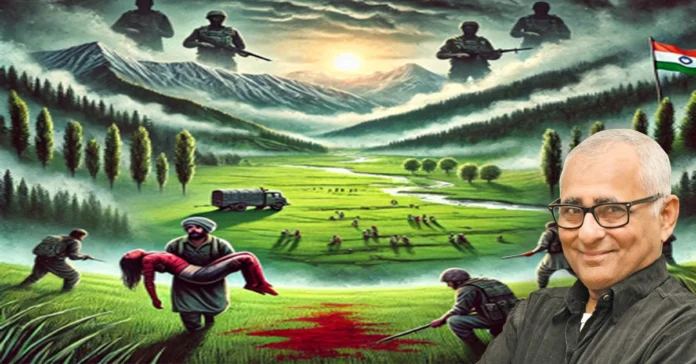In a world increasingly engulfed by conflict and cruelty, the cold-blooded murder of unarmed tourists in Kashmir’s Pahalgam region marks a grim resurgence of terror in a land that was cautiously rediscovering peace and political expression.
There are some moments so brutal, so unprovoked, that they slice through the fabric of daily life and silence political rhetoric, leaving behind only horror and grief. The massacre of civilian tourists in the idyllic meadowlands of Pahalgam in Kashmir is one such moment. In an act that can only be described as classical terrorism, gunmen ambushed and slaughtered innocents—people who had come not as occupiers, soldiers, or agitators, but as visitors embracing the peace and beauty of a once-restive region slowly reclaiming its place on the map as a symbol of healing.
The killings are a devastating reminder that terrorism remains alive and malicious in our world—stretching its poisonous fingers across continents, be it in the Middle East, the Sahel, Europe, or Asia. Kashmir, after years of relative calm, is once again bloodied. The fragile silence that had settled over the Valley is broken.
This is not to say that Kashmir was free of tensions. The region’s sentiment for autonomy and the demand for the restoration of statehood—once enshrined in Article 370 of the Constitution—remains deeply embedded in the political psyche of its people. However, that sentiment in recent years was being voiced not with guns and stones, but through ballots and debate. Moderate nationalist voices like that of Chief Minister Omar Abdullah had worked to channel political aspirations into democratic processes. The Valley was inching, hesitantly, but meaningfully, towards political normalization. The massacre at Pahalgam has rudely disrupted that narrative.
It has not only thrust the Valley back into the national security spotlight, but has also placed moderate leaders on the defensive. For politicians like Omar Abdullah— who have walked the tightrope of peace advocacy and nationalist legitimacy—such attacks make it harder to argue for dialogue over deterrence. At the same time, it exposes the glaring vulnerabilities in New Delhi’s security strategy.
How could such a catastrophic lapse occur in a region with over 7,00,000 security personnel—one of the most militarized zones in the world? How was a major tourist hub, known for its accessibility and terrain, left so inadequately policed? What intelligence failures led to this breakdown? These are questions that deserve immediate, transparent answers.
New Delhi’s reaction has been swift and predictable. Diplomatic relations with Islamabad have nosedived further. India has recalled its High Commissioner, suspended dialogue, and, most significantly, hinted at reviewing or suspending the Indus Waters Treaty—a 1960 agreement brokered by the World Bank which governs the use of six rivers shared by India and Pakistan. The Treaty, remarkably resilient even during wartime, is now being labelled by Islamabad as a “red line,” with Pakistani officials warning that its abrogation would constitute “an act of war”.
This incident, then, is not just another tragic terror attack—it is potentially a new flashpoint between two nuclear-armed neighbours with a long and bloody history. In a world already destabilized by war in Ukraine, tensions in Taiwan, and unrest in Sudan, the subcontinent teeters dangerously close to another escalation. But the immediate danger lies not only in geopolitical brinkmanship.
With India heading into regional elections, the tragedy in Pahalgam is being weaponized for political gain. As has happened before, some are exploiting the massacre to stoke religious divisions. Fanatical media outfits and social media hate factories are casting the attack as a Muslim assault on Hindus, sweeping aside nuance, fact, and humanity in pursuit of a crude, communally charged narrative. This is not just inaccurate—it is obscene.
It was Kashmiris themselves who carried wounded tourists across difficult terrain to safety. It was Kashmiri villagers who opened their homes and hearts to those fleeing death. To now paint these people as “terror sympathizers” is to add insult to injury—to betray their humanity for political point-scoring.
If we fall for this trap—if we allow ourselves to see this attack not as terrorism, but as a religious war—then we play directly into the hands of the perpetrators. That is precisely their goal: to spark civil strife, to pit brother against brother, to destabilize India from within. We must not let them succeed.
Yes, terrorism must be rooted out—surgically, ruthlessly, and with precision. There can be no tolerance, no negotiation, no ambiguity when it comes to those who would turn children and tourists into corpses. But the response must also include soul-searching. How did this happen? Who failed? What systems broke down?
And as we seek justice, we must not transform this war against terrorism into a war against Kashmiris. To do so would only alienate the very people whose cooperation is essential to winning peace. It would undo decades of effort and reinforce the terrorist narrative that India does not want Kashmiris—it wants their land without their voice.
In our grief, we must find resolve. In our anger, we must seek clarity. And in our response, we must demonstrate the strength not only of our military, but of our moral compass.
Let us all mourn what happened in Pahalgam—let us mourn the lost lives, the shattered families, and the bloodstained soil of one of nature’s most beautiful places. But let our mourning give way not to vengeance or bigotry, but to a fierce determination: to make sure this never happens again. Through better security. Through better politics. Through a united, inclusive, and just vision for all of India.
Only then will the rivers of red in Pahalgam give way once again to the rivers of life, flowing through a valley that has seen too much sorrow and deserves a chance at lasting peace.


